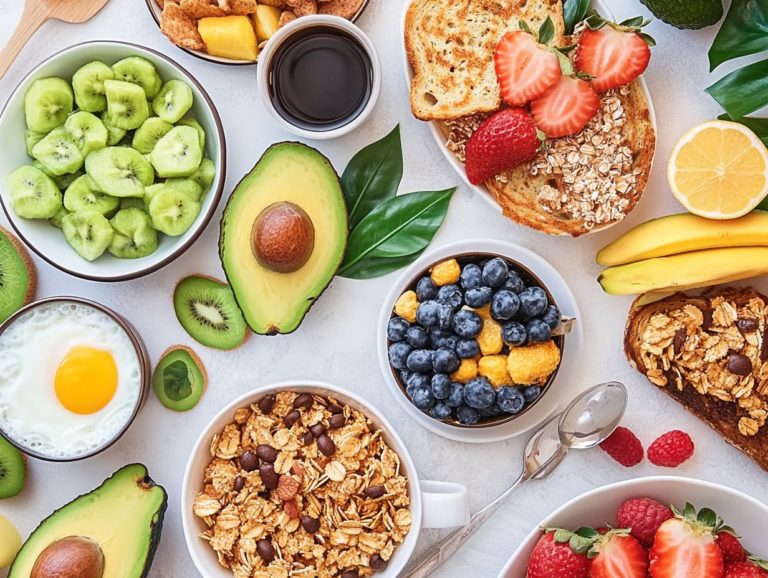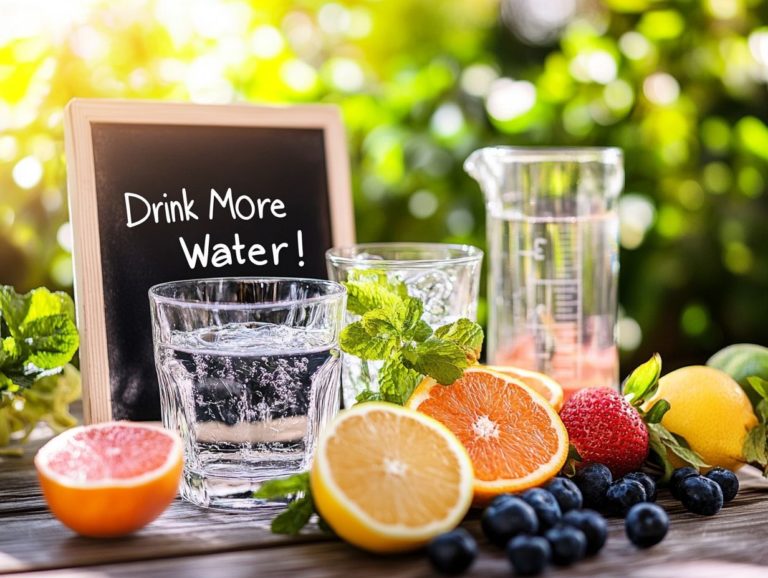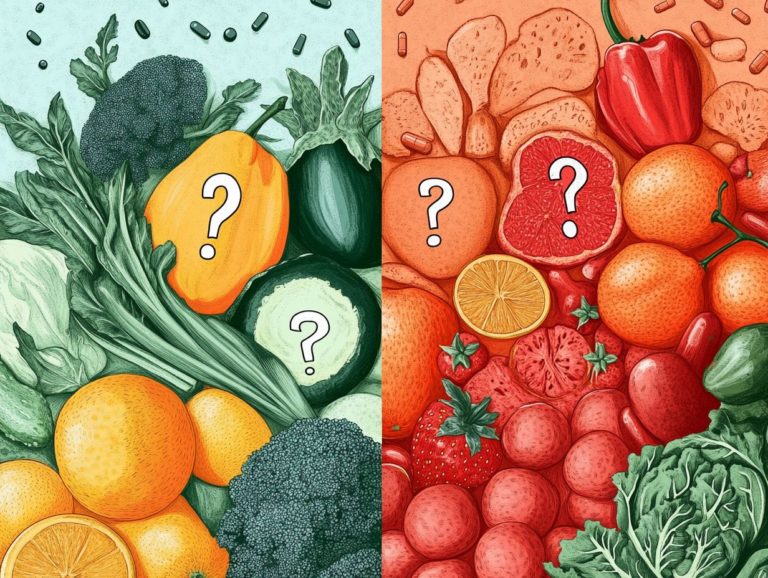Are All Processed Foods Unhealthy?
Processed foods frequently ignite discussions regarding their health implications. Yet, it s important to recognize that not all are created equal.
This article delves into the essence of processed foods, categorizes the various types, and evaluates their advantages and disadvantages. It also examines how these foods impact your health and provides practical tips for making wiser choices without the need to eliminate them entirely.
Whether you re a health enthusiast or simply curious, this guide empowers you to navigate the realm of processed foods with confidence and insight.
Contents
- Key Takeaways:
- Understanding Processed Foods
- Types of Processed Foods
- The Truth About Processed Foods
- Impact of Processed Foods on Health
- How to Make Healthier Choices
- Frequently Asked Questions
- Is it true that all processed foods are unhealthy?
- What are some examples of processed foods that can be part of a healthy diet?
- What types of processed foods should be avoided for a healthier diet?
- Can processed foods ever be a healthier option compared to unprocessed foods?
- What are some tips for choosing healthier processed foods?
- Can processed foods be a part of a balanced and healthy diet?
Key Takeaways:
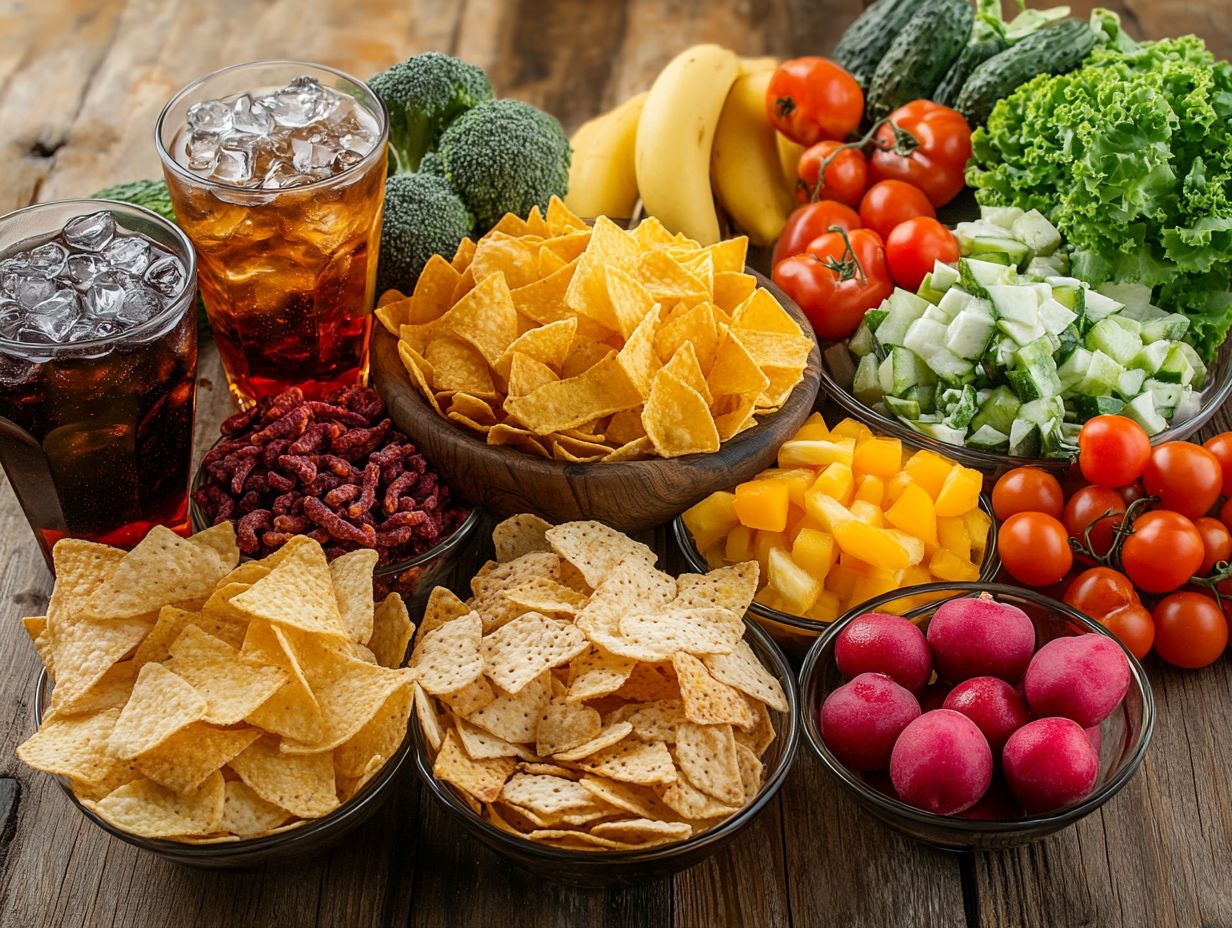
- Not all processed foods are unhealthy. Understanding the different types can help you make informed choices.
- Processed foods can have positive and negative effects on health. Being aware of the pros and cons can guide better decisions.
- Moderation and making healthier choices are key when incorporating processed foods into a balanced diet. Tips for choosing less processed options can be very helpful.
Understanding Processed Foods
Understanding processed foods is essential in today s dietary landscape. These products span a wide spectrum, from minimally processed to ultra-processed varieties.
The methods used to process foods can greatly impact their nutritional quality, health outcomes, and even food security. This makes it vital for you to be well-informed about your choices.
A system that classifies foods based on how much they’ve been processed offers a structured method to categorize these products. This system helps guide you through the complexities of modern diets and the health risks they may entail.
Defining Processed Foods
Processed foods encompass any item that has undergone changes from its original form. This includes methods such as preservation, freezing, or the incorporation of food additives.
These alterations can range from simple actions like washing and cutting to more intricate processes that involve chemical preservatives or flavor enhancers. In contrast, unprocessed foods remain in their natural state, typically consisting of fresh fruits and vegetables, whole grains, and unrefined meats.
The array of food processing techniques is vast. For instance, canning and dehydrating are popular methods to extend shelf life, while pasteurization plays a critical role in eliminating harmful bacteria.
While processed foods provide convenience, they often come laden with added sugars, sodium, and unhealthy fats. This prompts essential questions about their nutritional value compared to unprocessed options, which generally maintain their vitamins, minerals, and overall health benefits.
Types of Processed Foods
Processed foods can be classified into several categories, including minimally processed foods, processed culinary ingredients, and ultra-processed foods.
Each category possesses unique characteristics and varying implications for your health. Understanding these distinctions empowers you to make more informed choices about what you consume.
Categories and Examples
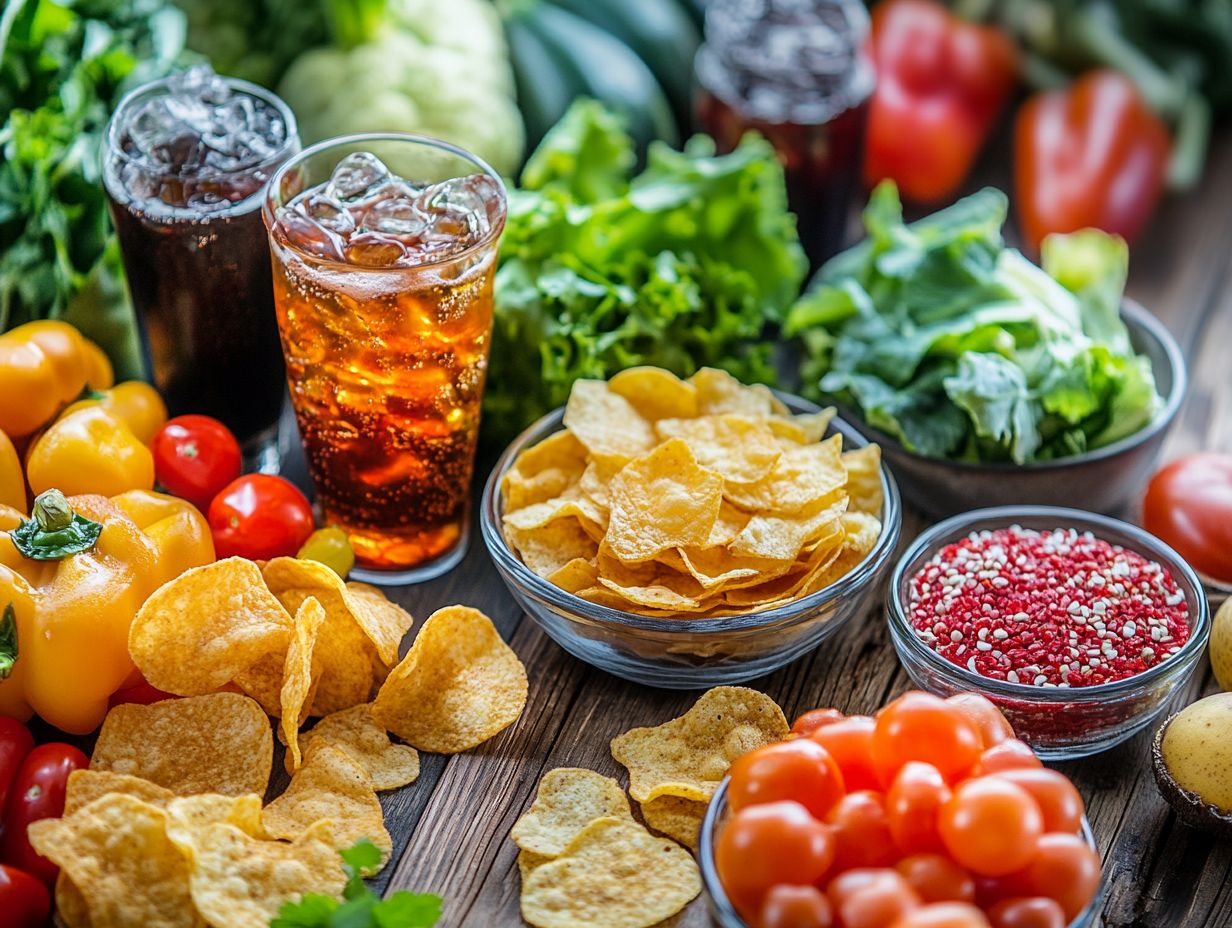
Categories of processed foods include minimally processed, processed culinary ingredients, and ultra-processed foods.
Examples include frozen meals and pre-prepared options that are often loaded with various food additives. These classifications help you understand items based on their level of processing and ingredient complexity.
When you choose minimally processed foods like washed and cut vegetables you retain most of their natural nutrients, making them a smart choice for anyone mindful of their health.
On the other hand, processed culinary ingredients, such as oils and sugars, can enhance the flavor of your dishes but often come with a high caloric density. This could lead to weight gain if you re not careful.
Meanwhile, ultra-processed foods, typically found in the snack aisles, are usually stuffed with sugars, unhealthy fats, and preservatives. These have raised alarm bells due to their associations with a range of health problems, including obesity and heart disease.
As consumers, you are increasingly recognizing these distinctions, evaluating your food choices with a more discerning eye in light of a growing understanding of nutrition.
Start checking labels and make conscious food choices today!
The Truth About Processed Foods
The reality of processed foods is intricate, presenting a blend of potential nutritional advantages and notable health risks.
It’s important to look closely at ingredient lists and food labels.
Pros and Cons
Processed foods offer advantages like convenience and a long shelf life. However, they also pose health risks due to high levels of added sugars, sodium, and unhealthy fats.
In our busy lives, the appeal of ready-to-eat meals and snacks can be hard to resist, especially when time feels scarce. While these options simplify meal preparation, relying on them too heavily might increase the risk of chronic diseases.
Think about sugary breakfast cereals and instant noodles. They are quick and budget-friendly but often lack essential nutrients.
Finding a balance is crucial for your health now. By incorporating whole fruits, vegetables, and whole grains into your diet, you can counteract the health downsides of processed foods.
Ultimately, understanding the implications of consuming processed foods empowers you to make informed dietary choices that support your overall health and well-being.
Impact of Processed Foods on Health
The influence of processed foods on health is significant, linked to a growing list of chronic diseases, including heart disease and obesity.
These conditions are becoming alarmingly common in today s society.
Negative Effects on the Body
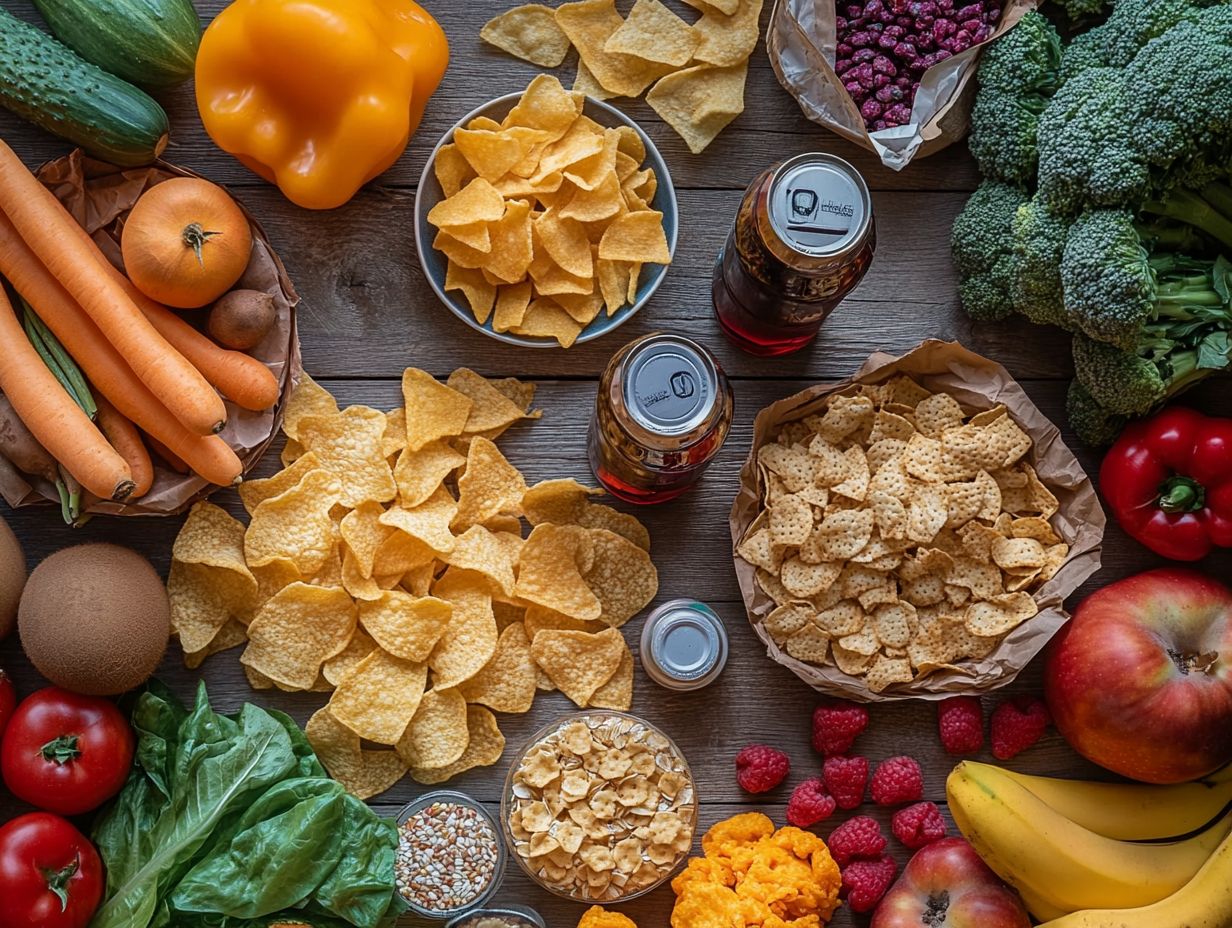
Have you noticed weight gain or fatigue? Processed foods might be to blame. Their negative effects can manifest as weight gain, elevated sodium levels, and nutrient deficiencies, contributing to chronic diseases.
These imbalances can lead to serious health problems like heart disease and diabetes.
Excessive amounts of added sugars and unhealthy fats common in many processed foods strain your metabolic processes, often leading to insulin resistance and inflammation.
The absence of essential vitamins and minerals in processed options diminishes the overall nutritional quality of your diet, which can weaken your immune system.
By increasing your intake of highly processed snacks, you might unknowingly elevate your risk for serious long-term health issues. This highlights the importance of mindful eating and making whole food choices.
How to Make Healthier Choices
Navigating the sea of processed foods in today s market calls for a discerning eye. Scrutinizing nutrition labels, choosing minimally processed items, and embracing beneficial cooking methods are essential steps.
By doing so, you empower yourself to make healthier choices that can significantly enhance your well-being.
Tips for Choosing Less Processed Options
Choosing less processed options is simpler when you focus on minimally processed foods and carefully examine ingredient lists.
Prioritize items with whole ingredients to elevate your nutrition without compromising taste. Look for products with a short list of recognizable components, avoiding those packed with added sugars and artificial additives.
This often means opting for foods that feel more natural, such as whole grains, fresh produce, and lean proteins.
Developing a habit of scrutinizing labels will enhance your eating choices and help you embrace a nutrient-rich diet free from unnecessary chemicals.
Start today by checking your pantry for processed foods your health depends on it!
Incorporating Processed Foods in Moderation
Incorporating processed foods into your diet can be enjoyable when done in moderation. This way, you can savor quick meals while staying committed to healthy whole foods.
Be aware of food labels. Choose options with fewer additives and preservatives.
Being careful about what you eat gives you the power to recognize when processed foods can satisfy your cravings.
By prioritizing whole foods most of the time, you can enjoy the occasional indulgence without compromising your health.
Frequently Asked Questions
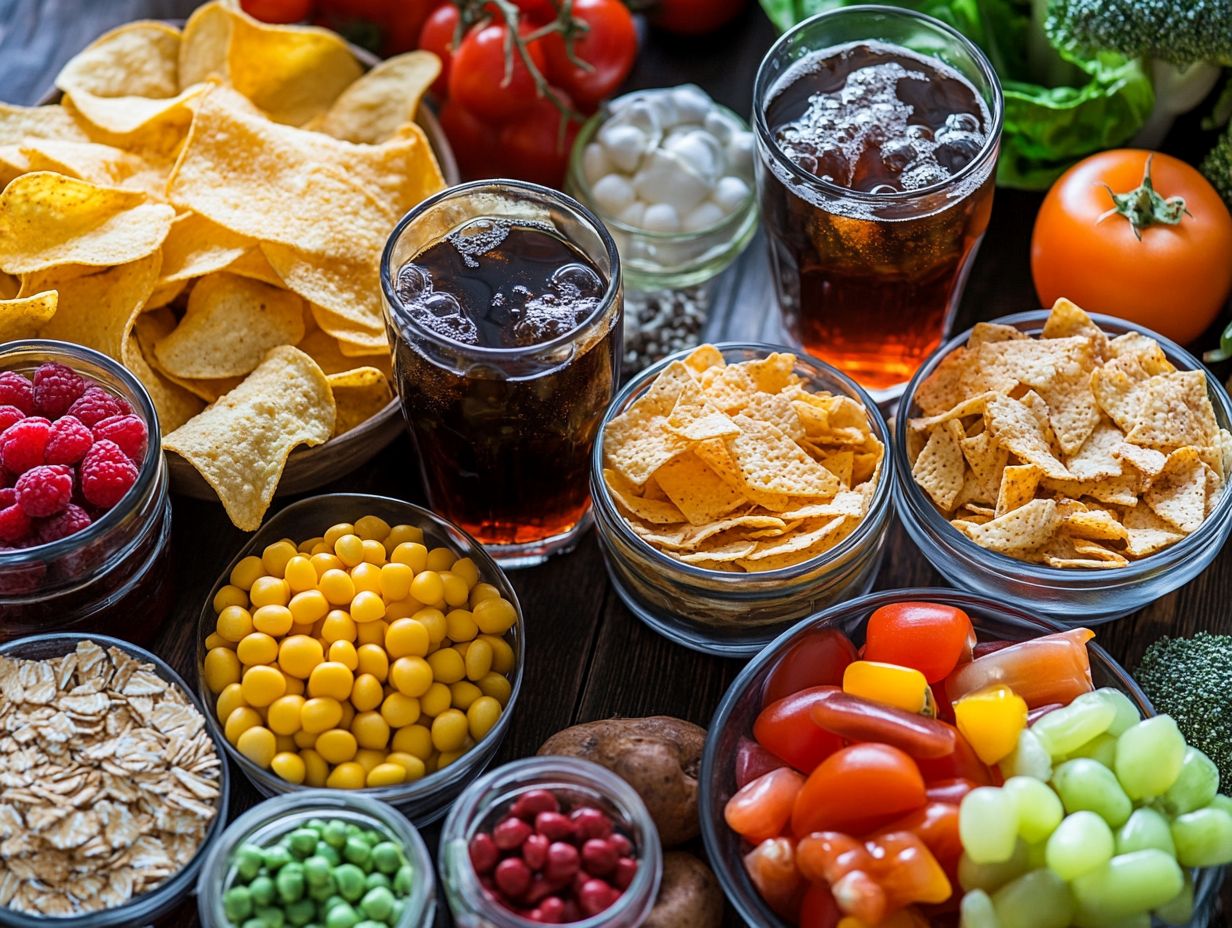
Is it true that all processed foods are unhealthy?
Not necessarily. Some processed foods, like frozen vegetables and canned beans, can fit into a healthy diet.
What are some examples of processed foods that can be part of a healthy diet?
Minimal processed foods, such as frozen fruits, canned fish, whole grain bread, and plain yogurt, can be healthy options.
What types of processed foods should be avoided for a healthier diet?
Limit highly processed foods, like candy and sugary drinks. These often contain harmful sugars and fats.
Can processed foods ever be a healthier option compared to unprocessed foods?
Yes, sometimes. Fortified cereals and milk can provide extra nutrients. They may also be more convenient and affordable.
What are some tips for choosing healthier processed foods?
Read the labels carefully. Look for options with limited sugars and fats, and choose products with simple ingredients.
Can processed foods be a part of a balanced and healthy diet?
Yes, they can! Moderation is key. Enjoy some healthier processed options while focusing on whole, unprocessed foods for best health.

